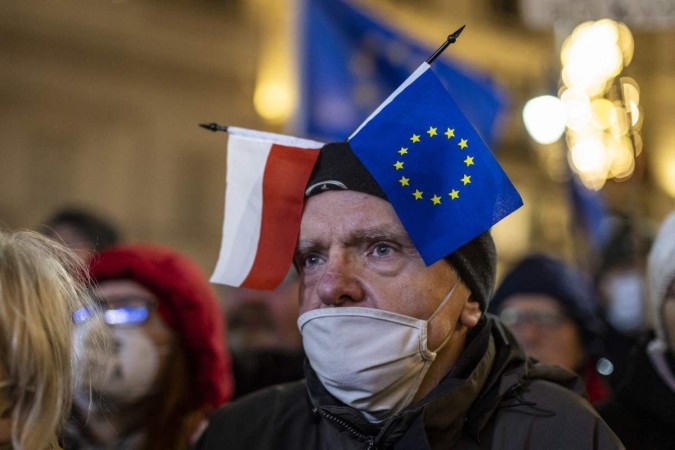
Published 12/23/2021 06:00

(credit: AFP)
Relations between the European Union and Poland, already in the process of eroding, were even more shaky yesterday. In a sort of alarm, the European Commission, the bloc’s executive organ, has opened a violation procedure against the government of ultra-nationalist Prime Minister Mateusz Morawiecki, motivated by “serious concerns” about possible insults to the principles of the rule of law in the country, in particular regarding the independence and independence of the judiciary.
The action comes two months after the decision by the Polish Constitutional Court, which questioned the primacy of European law. The European Commission, which monitors the application of the bloc’s treaties, has sent a communication to Morawiecki’s government, which will have two months to provide its explanations. The infringement procedure can end up in the hands of the European Court of Justice (ECJ) and result in financial penalties.
“We consider that this case law violates the general principles of autonomy, priority, efficacy and uniform application of Union law, and of the binding decisions of the Court of Justice (of the European Union),” stated the European Commissioner for the Economy, Paolo Gentiloni. “We also consider that the Constitutional Court no longer responds to the demands of an independent and impartial court established by law as required by the Treaty on the European Union,” he added.
interaction
The Polish prime minister immediately responded, criticizing the decision. According to Morawiecki, the European Commission’s initiative shows progress in the “direction towards the development of bureaucratic centralization” in Brussels. “We must put an end to this,” he said, adding that the Polish Constitutional Court had responded to “all the demands for independence.”
“It is a constitutional court that deals with the Constitution with the aim of making it truly the supreme law of the Republic of Poland,” the Prime Minister declared. He stressed that “if the European Commission misunderstands the principle of the powers conferred by Article 5 of the Treaty on the European Union, this is of course a problem.”
Relations between Poland and the European Union are strained by disagreements over a series of controversial judicial reforms promoted by Warsaw. For Brussels, these measures are incompatible with democratic freedoms. For its part, the Polish government claims that it is necessary to put an end to the corruption of judges.
Recently, Poland received two sentences from the European justice. On October 27, she was ordered to pay €1m a day for disrupting the controversial Disciplinary Chamber of the Supreme Court. A month earlier, the Morawiecki government was required to spend 500,000 euros per day to close the lignite mine. Warsaw refuses to pay the two fines.
Arm wrestling between the EU and Poland has been going on for years, as a result of judicial reforms implemented by the prime minister, the conservative nationalist Law and Justice party, in power since 2015. These changes, according to international analysts, have undermined the independence of judges.
Tensions were heightened by a July 14 decision of the Polish Constitutional Court under the influence of the ruling party. Through it, this court declared that the decisions of the Supreme Judicial Council regarding the judicial reforms implemented in the country are inconsistent with the constitution.
Relations deteriorated further in October, when the constitutional body, at Morawiecki’s request, challenged the supremacy of European law over domestic law, declaring some articles of EU treaties “incompatible” with the national constitution.
Poland’s controversial justice reforms are also at the heart of the European Commission’s blockade of the country’s recovery plan. Brussels is asking Warsaw to stop the activities of the disciplinary chamber of judges, according to a ruling by CJEU accusing it of not being independent from political power.
Shut up
Internally, the situation is also complicated. Thousands protested Sunday outside Poland’s presidential palace against a new media law that critics say is aimed at silencing the country’s main independent news channel.
“Freedom of the media! We want a veto!” the demonstrators chanted. They waved European Union flags and urged President Andrzej Duda not to pass the law. “We need freedom of expression,” said 38-year-old Emilia Zlotinska.
Journalists and opposition figures such as former Council of Europe President Donald Tusk joined the crowd. “We are here to defend a free press. When we unite in solidarity, we will win. Together, we will take down this government,” said Tusk, who now heads the Civic Platform party.

“Proud explorer. Freelance social media expert. Problem solver. Gamer.”






